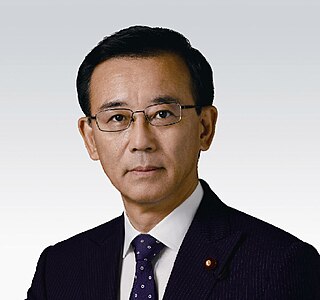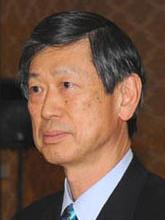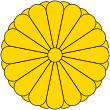
The politics of Japan are conducted in a framework of a multi-party bicameral parliamentary representative democratic constitutional monarchy whereby the Emperor is the ceremonial head of state and the Prime Minister is the head of government and the head of the Cabinet, which directs the executive branch.

Takeo Fukuda was a Japanese politician and the 42nd Prime Minister of Japan from 24 December 1976 to 7 December 1978.

Yoshirō Mori is a Japanese politician who served as the 55th Prime Minister of Japan between 5 April 2000 and 26 April 2001. Described as having "the heart of a flea and the brain of a shark," he was an unpopular prime minister mainly remembered today for his many gaffes and situationally inappropriate actions. He is currently President of the Japan Rugby Football Union as well as the Japan-Korea Parliamentarians' Union. In 2014, he was appointed to head the organizing committee for the 2020 Summer Olympics.

Taku Yamasaki is a Japanese politician who served in the House of Representatives from 1972 to 2003 and from 2005 to 2009. He directed the Japan Defense Agency for two months in 1989, and served as Minister of Construction from 1991 to 1992. He was a prominent faction leader in the Liberal Democratic Party (LDP) during the late 1990s and early 2000s, and served as its Secretary-General and Vice President under Prime Minister Jun'ichirō Koizumi.

Nobutaka Machimura was a Japanese politician. He was a member of the House of Representatives of Japan and a member of the Liberal Democratic Party. He was Chief Cabinet Secretary in the government of Prime Minister Yasuo Fukuda from 2007 to 2008 and twice Minister for Foreign Affairs, in the cabinets of Junichiro Koizumi and Shinzō Abe. He resigned as the Speaker of the House of Representatives on 21 April 2015 after suffering from a stroke.

Sadakazu Tanigaki is a Japanese politician who served as Minister of Finance from 2003 to 2006 in the cabinet of Jun'ichirō Koizumi. He also served as Minister of Construction and Transport in the cabinet of Yasuo Fukuda and served his ninth term as a member of the House of Representatives, representing Kyoto's Fifth District. He was elected as President of the Liberal Democratic Party (LDP) on 28 September 2009, following the party's massive defeat in the 2009 general election. He was replaced by Shinzō Abe on 26 September 2012. He was only the second LDP leader who was not simultaneously Prime Minister of Japan.

Shinzō Abe is a Japanese politician serving as Prime Minister of Japan and Leader of the Liberal Democratic Party (LDP) since 2012. He previously served as Prime Minister from 2006 to 2007 and Chief Cabinet Secretary from 2005 to 2006. In 2019, Abe succeeded Shigeru Yoshida as the second-longest serving Prime Minister in post-war Japan and the fourth-longest serving PM in Japanese history.

Fukushiro Nukaga is a Japanese politician and a member of the Liberal Democratic Party. He has been a member of the House of Representatives since 1983 and represents Ibaraki's 2nd district. He was Minister of Finance from 2007 to 2008.

Toshihiro Nikai is a Japanese politician. He was the Minister of Economy, Trade and Industry. A member of the Liberal Democratic Party (LDP), Nikai is currently serving in his eighth term in the Lower House representing Wakayama's Third District.

Yasuo Fukuda was the 58th Prime Minister of Japan, serving from 2007 to 2008. He was previously the longest-serving Chief Cabinet Secretary in Japanese history, serving for three and a half years (2000–2004) under Prime Ministers Yoshirō Mori and Junichiro Koizumi.

Masahiko Kōmura is a Japanese political activist, and former Vice-President of the Liberal Democratic Party (LDP). He was Minister for Foreign Affairs from 1998 to 1999 and again from 2007 to 2008, and he is a member of the House of Representatives for Yamaguchi 1st district.

Kaoru Yosano was a Japanese politician. He was a member of the Liberal Democratic Party (LDP), the Sunrise Party of Japan and former member of the House of Representatives, serving his ninth term in the Lower House representing Tokyo's first electoral district until his defeat in the Japanese general election, 2009. Yosano was Chief Cabinet Secretary to Prime Minister Shinzō Abe from August 2007 to September 2007 and was Minister of Economic and Fiscal Policy in Tarō Asō's administration from February to September 2009.
A leadership election was held in the Liberal Democratic Party of Japan on 23 September 2007 after the incumbent party leader and Prime Minister of Japan Shinzō Abe announced that he would resign on 12 September 2007. Abe had only been elected to the post slightly less than a year earlier; his resignation came only three days after a new parliamentary session had begun. Abe said his unpopularity was hindering the passage of an anti-terrorism law, involving among other things Japan's continued military presence in Afghanistan. Party officials also said the embattled Prime Minister was suffering from poor health.

Fumio Kishida is a Japanese politician and the former Minister for Foreign Affairs of Japan from 2012 to 2017. He is a member of the House of Representatives and the Liberal Democratic Party (LDP). He served in Yasuo Fukuda's cabinet as minister of state for Okinawa and northern territories affairs, science and technology policy, quality-of-life policy, and regulatory reform.

Yuko Obuchi is a Japanese politician. She is a member of the House of Representatives for the Liberal Democratic Party. She briefly served as Minister of Economy, Trade and Industry during the Abe government, but was forced to resign.
Events in the year 2007 in Japan.
The Liberal Democratic Party of Japan is the ruling party of Japan, with Party President Shinzō Abe being the Prime Minister of Japan. The Liberal Democratic Party is characterized by factionalism, where factions are sub-groups within a larger organisation. While factions characterize other political parties in Pacific Asia, Japanese factionalism is distinguished by its stability and institutionalization. Since the genesis of the Liberal Democratic Party in 1955, factions have existed, but they have changed over time. Despite this change, factions in the party today can be traced back to their 1955 roots, a testament to the stability and institutionalized nature of Liberal Democratic Party factions.

The Second Abe Cabinet governed Japan under the leadership of Prime Minister Shinzō Abe from December 2012 to December 2014. Following the return to power of the LDP in the 2012 general election, Abe, as party president, was elected Prime Minister by the National Diet on December 26, 2012, and presented his cabinet for swearing in by the Emperor later that day. Abe formed a coalition with the New Komeito Party, which has partnered with the LDP since the late 1990s, appointing former leader Akihiro Ota as Minister of Land. Together the two parties controlled a two-thirds majority in the House of Representatives, allowing the new government in most matters to override the veto of the upper house which was controlled by the opposition parties until July 2013.
A leadership election was held on 20 September 2018 to elect the next president of the Liberal Democratic Party of Japan for a new 3-year term. Incumbent president Shinzō Abe was running for re-election after a rule change in 2017 that allowed him to run for a third term.


















